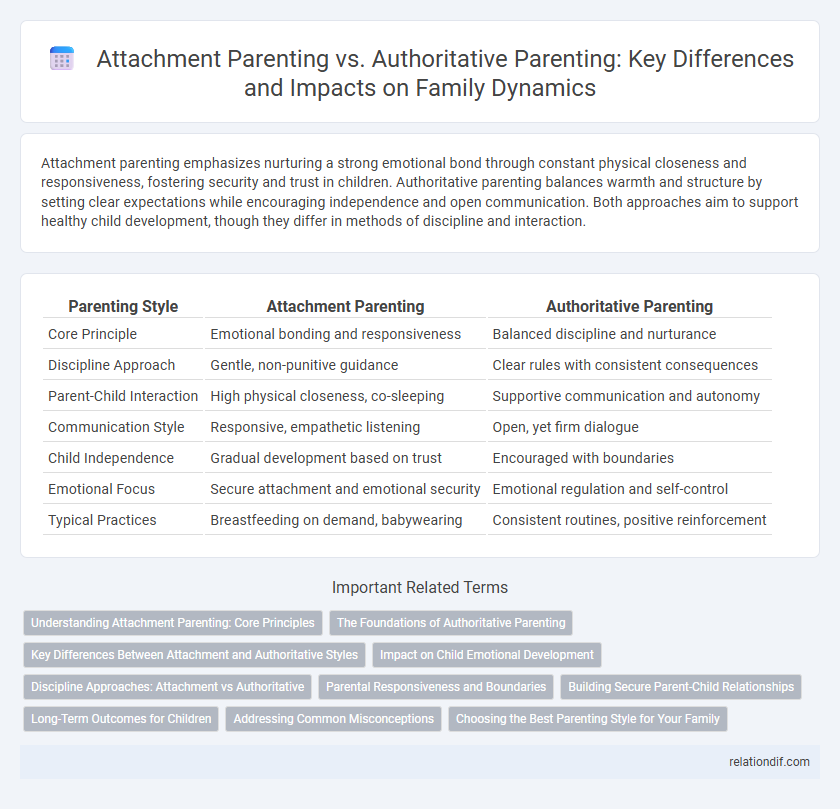Attachment parenting emphasizes nurturing a strong emotional bond through constant physical closeness and responsiveness, fostering security and trust in children. Authoritative parenting balances warmth and structure by setting clear expectations while encouraging independence and open communication. Both approaches aim to support healthy child development, though they differ in methods of discipline and interaction.
Table of Comparison
| Parenting Style | Attachment Parenting | Authoritative Parenting |
|---|---|---|
| Core Principle | Emotional bonding and responsiveness | Balanced discipline and nurturance |
| Discipline Approach | Gentle, non-punitive guidance | Clear rules with consistent consequences |
| Parent-Child Interaction | High physical closeness, co-sleeping | Supportive communication and autonomy |
| Communication Style | Responsive, empathetic listening | Open, yet firm dialogue |
| Child Independence | Gradual development based on trust | Encouraged with boundaries |
| Emotional Focus | Secure attachment and emotional security | Emotional regulation and self-control |
| Typical Practices | Breastfeeding on demand, babywearing | Consistent routines, positive reinforcement |
Understanding Attachment Parenting: Core Principles
Attachment parenting emphasizes forming a secure emotional bond between parent and child through consistent responsiveness, physical closeness, and empathetic communication. Core principles include practices such as babywearing, co-sleeping, and breastfeeding on demand to nurture trust and emotional security. This approach fosters a strong foundation for healthy emotional development and resilience in children.
The Foundations of Authoritative Parenting
Authoritative parenting is grounded in a balanced approach that combines high responsiveness with high demands, promoting open communication and setting clear boundaries for children. This style fosters autonomy while maintaining structure through consistent rules and supportive guidance. Research shows children raised with authoritative parenting exhibit better social skills, emotional regulation, and academic success compared to other parenting styles.
Key Differences Between Attachment and Authoritative Styles
Attachment parenting emphasizes strong emotional bonds and responsive caregiving, prioritizing physical closeness and nurturing to foster secure parent-child relationships. Authoritative parenting balances warmth and structure, combining high responsiveness with clear boundaries and consistent discipline to promote independence and self-regulation. Key differences include attachment's focus on emotional availability and physical closeness versus authoritative's emphasis on setting limits and encouraging autonomy.
Impact on Child Emotional Development
Attachment parenting fosters secure emotional bonds through consistent responsiveness and physical closeness, promoting empathy and self-regulation in children. Authoritative parenting balances warmth with clear boundaries, enhancing emotional intelligence and resilience by encouraging open communication and independence. Both styles contribute to positive emotional development, but attachment parenting emphasizes emotional security while authoritative parenting prioritizes autonomy and social competence.
Discipline Approaches: Attachment vs Authoritative
Attachment parenting emphasizes gentle discipline strategies such as positive reinforcement, natural consequences, and consistent emotional responsiveness to foster trust and secure bonds. Authoritative parenting blends firm, clear boundaries with warmth and open communication, encouraging self-discipline and accountability through structured rules and reasoned explanations. Both approaches prioritize the child's emotional development but differ in their balance of nurturing connection versus enforcing independence and responsibility.
Parental Responsiveness and Boundaries
Attachment Parenting emphasizes high parental responsiveness by closely attending to a child's emotional and physical needs, fostering secure emotional bonds through consistent nurturing. Authoritative Parenting balances responsiveness with clear, firm boundaries, promoting independence while maintaining structured guidance to support social and emotional development. Both approaches recognize the importance of parental involvement but differ in their strategies for setting limits and encouraging autonomy.
Building Secure Parent-Child Relationships
Attachment parenting emphasizes consistent physical closeness, responsiveness, and emotional attunement to foster secure parent-child bonds, promoting trust and emotional resilience. Authoritative parenting balances warmth with clear boundaries and consistent discipline, encouraging independence while maintaining strong emotional connections. Both approaches prioritize creating a nurturing environment that supports a child's sense of security and healthy emotional development.
Long-Term Outcomes for Children
Attachment parenting fosters secure emotional bonds, promoting increased empathy and higher self-esteem in children, which contribute to healthier social relationships and emotional resilience over time. Authoritative parenting, characterized by balanced discipline and open communication, leads to improved academic performance, better problem-solving skills, and greater independence in children. Both approaches positively impact long-term child development, but attachment parenting excels in emotional security while authoritative parenting enhances cognitive and social competence.
Addressing Common Misconceptions
Attachment parenting often faces misconceptions that it leads to overdependent children, while authoritative parenting is sometimes mistaken for being overly strict. Research shows attachment parenting fosters secure bonds that promote independence, and authoritative parenting balances firm boundaries with emotional responsiveness. Understanding these distinctions helps parents adopt strategies that support healthy child development and emotional well-being.
Choosing the Best Parenting Style for Your Family
Attachment parenting emphasizes emotional bonding through consistent responsiveness and physical closeness, fostering secure child development. Authoritative parenting balances firm boundaries with warmth and open communication, promoting independence and social competence. Selecting the best parenting style depends on your family's values, child temperament, and lifestyle to create a supportive, nurturing environment.
Attachment Parenting vs Authoritative Parenting Infographic

 relationdif.com
relationdif.com